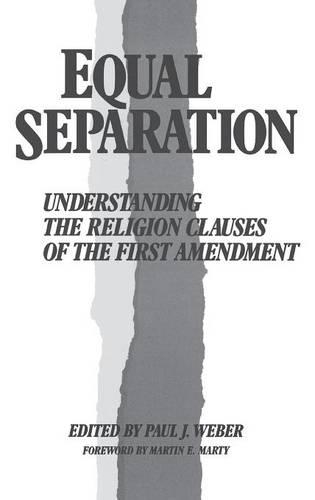
Equal Separation: Understanding the Religion Clauses of the First Amendment
(Hardback)
Publishing Details
Equal Separation: Understanding the Religion Clauses of the First Amendment
By (Author) Paul J. Weber
Bloomsbury Publishing PLC
Praeger Publishers Inc
23rd May 1990
United States
Classifications
Tertiary Education
Non Fiction
347.302852
Physical Properties
Hardback
200
Description
Scholars agree that religion-clause jurisprudence is in disarray: The Supreme Court is divided on the issue; religious lobbyists and litigators aggressively pursue their often conflicting goals; and novel pieces of church-state litigation are frequent news items. Editor Paul J. Weber argues that a 25-year-old theory called strict neutrality may provide a foundation on which a more compelling theory of the First Amendment religion clauses can be developed. Although superficially examined in a search for new approaches by many law-review authors, very little serious analysis has been done of strict neutrality/equal separation and little attempt has been made to develop the concept. In Equal Separation, the pros and cons of strict neutrality are argued by six outstanding scholars who represent a challenging array of viewpoints; each critiques the concept by focusing on a different perspective. Despite vigorous disagreement over the conditions required for religious liberty and nonestablishment and the means necessary to achieve them, each author's dedication to the concepts is clearly manifested in this volume. In the first chapter, Weber outlines a strict neutrality thesis. The next three chapters enlarge upon criticisms that focus on a defense of the free exercise of religion; offer a defense against strict neutrality's assault on the establishment clause; and contrast accommodation--pluralist theory--with strict neutrality. The issue of strict neutrality and the schools is addressed in Chapter 5, and an overview of the Court's development of the concept of separation of church and state is presented in Chapter 6. The editor's concluding chapter explores the criticisms and defends the strict neutrality/equal separation theory. This volume will be of particular interest to constitutional scholars, jurisprudents, and professors and students of law.
Reviews
Can any single theory direct the interpretation of the religious clauses of the First Amendment--clauses that clash as often as they concur Can equal separation (the theory first put forth by Philip Kurland in 1962) be that theory Weber begins with an essay answering yes to both questions. The rest of the volume contains essays by James Dunn, Robert Healey, Dean Kelley, William Marty, and Stephen Monsma, who offer critiques of the equal separation/neutrality principle, and Weber's response to each. The book succeeds in two ways. First, the quality and variety of the essays are excellent; the Kelley and Monsma pieces, in particular, are packed with insights on religion and politics. Second, continuity is provided by Weber's responses and by his concluding chapter, which focuses on areas of agreement and disagreement among the contributors. . . . Excellent bibliography. Highly recommended for upper-division undergraduates and graduate students.-Choice
This book is a good overview of the verious ways scholars perceive how the religion clauses, especially the establishment clause, ought to be interpreted....it is likely to be most useful to church-state wonks....a rather good book on a topic of tremendous practical, as well as theoretical importance.-Journal of American Academye of Religion
"This book is a good overview of the verious ways scholars perceive how the religion clauses, especially the establishment clause, ought to be interpreted....it is likely to be most useful to church-state wonks....a rather good book on a topic of tremendous practical, as well as theoretical importance."-Journal of American Academye of Religion
"Can any single theory direct the interpretation of the religious clauses of the First Amendment--clauses that clash as often as they concur Can equal separation (the theory first put forth by Philip Kurland in 1962) be that theory Weber begins with an essay answering yes to both questions. The rest of the volume contains essays by James Dunn, Robert Healey, Dean Kelley, William Marty, and Stephen Monsma, who offer critiques of the equal separation/neutrality principle, and Weber's response to each. The book succeeds in two ways. First, the quality and variety of the essays are excellent; the Kelley and Monsma pieces, in particular, are packed with insights on religion and politics. Second, continuity is provided by Weber's responses and by his concluding chapter, which focuses on areas of agreement and disagreement among the contributors. . . . Excellent bibliography. Highly recommended for upper-division undergraduates and graduate students."-Choice
Author Bio
PAUL J. WEBER is Professor and Chairperson, Department of Political Science, at the University of Louisville. He is the author of Private Churches and Public Money (Greenwood Press, 1981), and Unfounded Fears: Myths and Realities of a Constitutional Convention (Greenwood Press, 1989).
